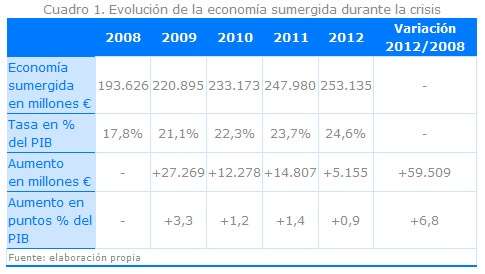Spain's Economy Surges—Off the Books
Not that Europe is lacking for economic basket cases, but Spain has been an especially fascinating train wreck to watch, with the unemployment rate hitting 27 percent last year. Official statistics are so dismal that they could be expected to produce riots in the streets; that they haven't is evidence that, somehow, Spaniards are finding ways to eat and pay the bills. If some sort of invisible economic activity were not under way, pointed out Victor Mallet and Guy Dinmore in a 2011 article in the Financial Times, "Spain would not be as peaceful as, barring a few demonstrations, it has so far been." Now comes confirmation from the country's government that the people of Spain have, in fact, retained their ability to work and create jobs and wealth—by staying as far under the state's radar as possible.
A new report from Spain's Finance Ministry reveals that the shadow economy—underground activity that would be legal, if subject to the usual tax and regulatory regime—has grown steadily every year from 2008 through 2012, the most recent year measured. In that time, the shadow economy increased from 17.8 percent of official GDP to 24.6 percent.

Perhaps unsurprisingly for a country troubled by state meddling with the economy, the shadow economy is smallest in Madrid, the seat of government, at 17.3 percent, and sharply larger in every other region, hitting 31.1 percent in Extremadura.
And Spain's economy is somewhat hobbled by government interference. On the 2014 Index of Economic Freedom, Spain ranks at 49, and 22nd out of 43 countries in Europe. "Its score is 0.8 point lower than last year due to declines in the management of government spending, business freedom, and labor freedom that outweigh small improvements in trade freedom and freedom from corruption."
For Spaniards looking to climb out of the country's economic doldrums, not only are taxes high, but "Incorporating a business takes 10 procedures and about three weeks, but completing licensing requirements takes over seven months and costs more than the level of average annual income. Labor regulations remain largely inflexible hindering job growth in the private sector."
The country has actually improved its overall economic freedom ranking a bit over the past 20 years, but unevenly and with decline in recent years, even as the Euro crisis made life difficult.
As they grapple with the growth of the shadow economy, Spanish officials, like officials everywhere, will have to deal with the fact that underground activity can develop its own inertia as people get accustomed to living that way.
Writes economist Friedrich Schneider (PDF):
But even major tax reforms with major tax rate deductions will not lead to a substantial decrease of the shadow economy. Such reforms will only be able to stabilize the size of the shadow economy and avoid a further increase. Social networks and personal relationships, the high profit from irregular activities and associated investments in real and human capital are strong ties which prevent people from transferring to the official economy.
Having given people ample reason to hide their activities and experience in doing just that, Spain's government may have a tough time getting those underground entrepreneurs back into the official economy.


Show Comments (26)